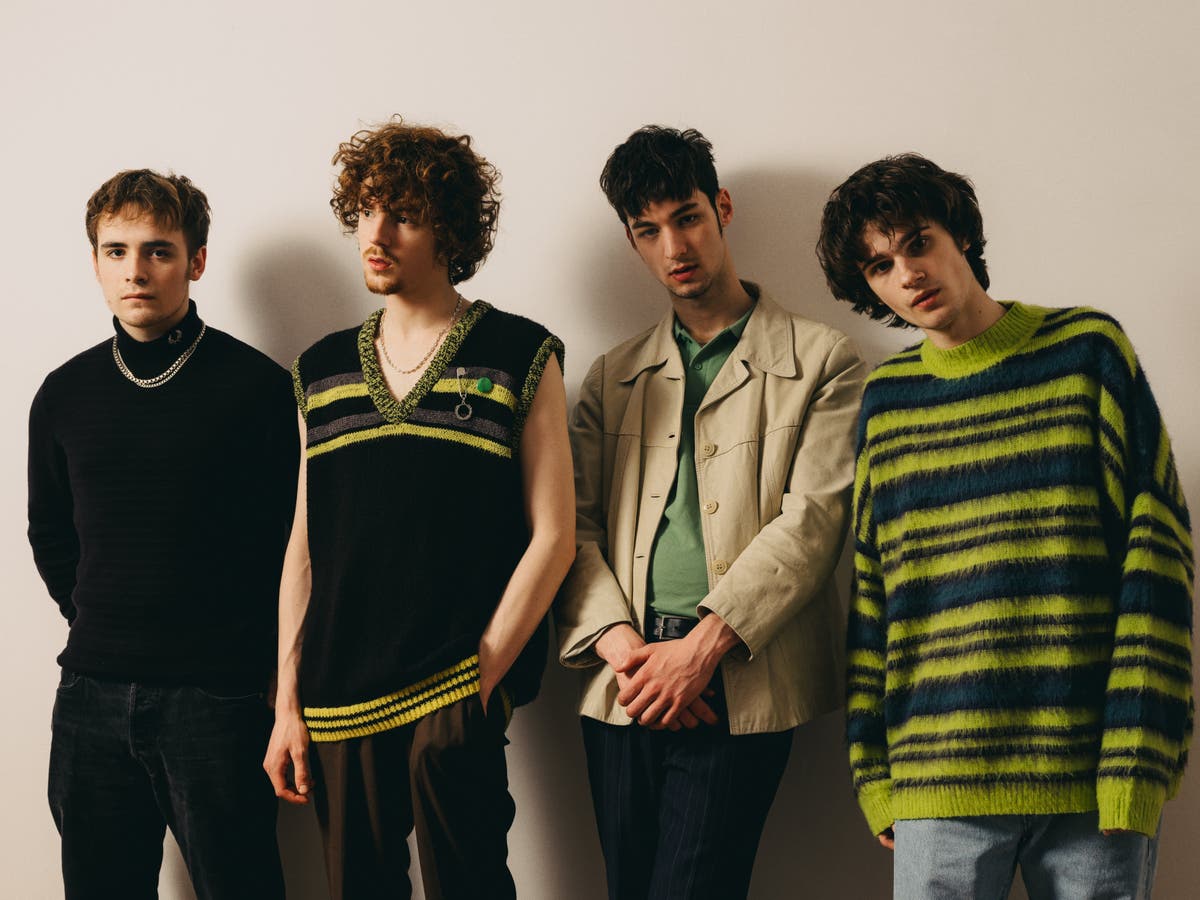
Sign up to Roisin O’Connor’s free weekly newsletter Now Hear This for the inside track on all things music Get our Now Hear This email for free Please enter a valid email address Please enter a valid email address SIGN UP I would like to be emailed about offers, events and updates from The Independent. Read our privacy notice Thanks for signing up to the
Roisin O’Connor’s email {{ #verifyErrors }}{{ message }}{{ /verifyErrors }}{{ ^verifyErrors }}Something went wrong. Please try again later{{ /verifyErrors }}
“There’s a generation staring down the barrel of a gun/And you won’t ever find them on the cover of The Sun.” This is how we meet tenacious Yorkshire four-piece The Lounge Society. The lyrics, taken from the band’s 2020 debut track “Generation Game” – and written when they were just 17 – introduce us to their distinctive brand of disco-infused punk. There’s energy, despair and frustration all in the mix. It’s striking for a first single. “It’s political, it’s aggressive, it’s long and not based around big hooks,’’ says guitarist Herbie May. “It’s everything a debut record shouldn’t have been and that’s why it was perfect.”
It’s an early indication of the size of their ambitions, but they have lofty goals when it comes to their sound, too. At one point May tells me: “We want to sound like The Velvet [Underground] and sell like The [Rolling] Stones – comparatively, not literally!”
Straddling rock, punk, disco, funk and everything in between, the group – completed by Cameron Davey (vocals, bass), Hani Paskin-Hussain (guitar) and Archie Dewis (drums) – have been “glued together like four nuclei in a cell” since meeting at school. Davey and May join me on a Zoom from their respective bedrooms in Hebden Bridge, West Yorkshire. They tell me how their closeness enables them to operate harmoniously on the road. “If you can survive a few years of high school with each other, you can survive anything,” May laughs.
Their friendship makes their collaborative writing process natural, instinctive even. You can hear it in their music: the mood-swinging pace changes, the smooth way that they harness the listener’s emotions. But outside of this natural flair, they are conscious of commercial success. Sonic structures are often chosen according to how they’ll be received live: “It’s jazz in ethos, but rock’n’roll in sound,” says May. “There are two strands: crazy jamming and also just trying to write ‘Love Me Do’.”
“Generation Game”, May tells me, is the perfect example of this collaboration. By combining their different lyrical styles – where the hyper-specific (“razor wires and watch towers”) meets metaphor (“you’re just a cog in their golden machine”) – they’re able to deliver a distinct and fresh take on the world. The song was initially written about their “shock and horror” at the “persecution” of the Uyghur Muslim communities in China, but later became a broader comment on the frustration of ongoing political issues. The band wanted to address those in power who have the ability to change things – and choose not to. “It’s almost like the world is waiting for Superman,” Davey says. At this, May jumps in and starts Bonnie Tyler’s “Holding Out For a Hero”. “It’s the punk version of that!”
“Generation Game” may be unconventional, but it’s the fastest-selling debut on record for south London indie label Speedy Wunderground. Co-run by producer Dan Carey, Alexis Smith and Pierre Hall, Speedy Wunderground is known for capturing the raw element of writing and performing. The label promises to complete recordings in short stints to “prevent over-cooking and ‘faff’” – something that appealed to the boys. After a chance email landed their music in Carey’s ears, the four-piece were signed while still in school, aged just 15.
Given their precocious success, it’s unsurprising that the politics of youth is the beating heart of The Lounge Society’s music: “I think we’d be half the band [we are] if we felt too timid to say things,” says May. The Lounge Society believe they have a responsibility to use their platform to tackle meaningful issues affecting the world. “You don’t just love a band for how they sound, you love them for who they are and what they stand for,” he says, speaking from experience. “We don’t have to change the world with a song, but maybe if enough artists make meaningful music it could have a serious impact.”
Although a political agenda is nothing new for a band – especially in a punk sphere – when it comes to The Lounge Society it feels strikingly fresh and authentic. The band’s Northern upbringing – which they describe as “a combination of beauty and terror” – gives them a different perspective. They explore local issues, such as in 2020’s “Burn the Heather”. The song condemns a local “sickening and barbaric” ritual of burning land to attract grouse for killing. Davey felt it was an important topic to address: “If where you live is known for being a nice town, but also for massacring wildlife, you don’t feel as proud to say you’re from there.”
‘It’s everything a debut record shouldn’t have been and that’s why it was perfect,’ says guitarist Herbie May (Alex Evans)
The band doesn’t shy away from personal issues either; after all, politics is personal. “You deal with politics every time something goes wrong or right for you,” says May. “Politics isn’t really just the decisions of the world’s most powerful people; it’s how you feel in the moment when you wake up and when you go out, when you get petrol or when you’re on social media.” This is what they address on their upcoming debut album Tired of Liberty (due for release on 26 August), which is as powerful sonically as it is lyrically.
Enjoy unlimited access to 70 million ad-free songs and podcasts with Amazon Music Sign up now for a 30-day free trial Sign up
Across the 11 tracks, bouncing bass is mashed with hooky choruses that give these sincere songs warmth and light. The sugar-glazed “North Is Your Heart” is about the “geographically privileged and financially hard done by” North and trying to find a new identity in the modern world. Meanwhile, “No Driver” articulates the feeling of – just about – keeping your head above the water, with creative endeavours acting as a “necessity” to escape depression. “The black dog knows you,” Davey howls with his chest. The song – recorded after tequila at 2am – is “like you’re using creativity as a way of just keeping ahead of it – and not always successfully”, May says.
But The Lounge Society don’t just want you to listen; they want you to dance. As we discuss their inclination for Seventies punk-funk bands such as ESG and Talking Heads, I question if there’s a certain power in combining heavier lyrical topics with music that holds a groove. Davey thinks so: “You lure people in with nice music and then jump out with an in-your-face chorus that’s heavily political.” May agrees: “Important topics just don’t get through if the music isn’t infectious. If you want to feed people politics, then the music’s got to taste good. You’ve gotta put some sugar on it!” he laughs.
For The Lounge Society, though, it always comes back to talking about their generation. The re-recorded version of “Generation Game” is the last track on Tired of Liberty. “We wanted it to end where it started,” says Davey, as I imagine the album tied up with a big bow. Their energy is youthful, but their attitude is mature – so the band are thinking ahead too. “Stay young and watch our futures growing old,” Davey roars on “Blood Money”. “The younger you are, the more opportunities you’ve had taken away from you,” says May, explaining the inspiration behind the lyrics. “That’s not to say that this generation has been worse off. There’s just decisions made that directly affect opportunities for young people – and what does a nation or civilisation have if not its youth?”
The Lounge Society’s debut album ‘Tired of Liberty’ is out on 26 August via Speedy Wunderground







